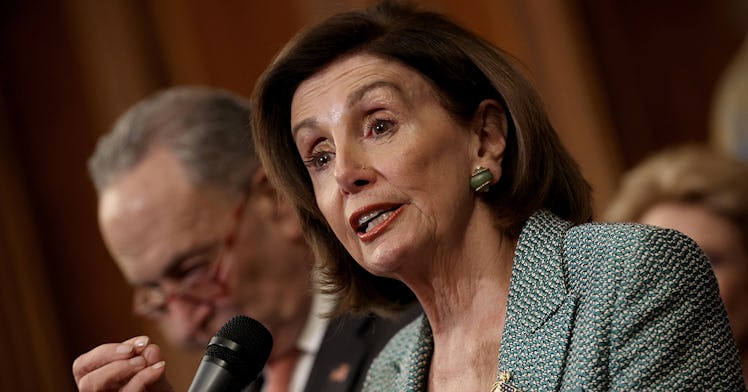The Families First Coronavirus Response Act Aims to Help Parents During Pandemic
The legislation was rushed through the House and provides aids to families, the elderly, and federal assistance programs. If only it gets passed.

Yesterday the World Health Organization (WHO) declared the novel coronavirus, which has spread to 114 countries and killed more than 4,000 people worldwide, a pandemic. A number of measures are already being enforced around the U.S. to encourage social distancing, including school closings, suspensions of NBA, NCAA, NHL, and MLB seasons, and more. Many more will soon follow as the disease continues to spread and many, many lives — and livelihoods — will be affected.
Understanding the need for assistance, yesterday, House Democrats introduced the “Families First Coronavirus Response Act,” a 124-page piece of legislation that would provide paid sick leave to workers who don’t already have it, establish free tests for Coronavirus and the COVID-19 illness it causes, and help families not feel the economic brunt of a global pandemic so severely. The legislation is expected to be voted on by the House today, March 12.
This legislation follows President Trump signing an $8.3 billion supplemental funding to find coronavirus last Friday, which helped the public health system get a crucial surge of cash. It also provided funds for vaccine development and loans for small businesses that might be affected by the emergency. The new spending package will ensure that families do not lose all of their income if they become ill and would have the ability to get tested should they think they have COVID-19.
While the details of theFamilies First Coronavirus Response Act still need to be ironed out in order to ensure passage, the Senate recently announced they would work through next week’s recess to coordinate funding packages and responses to the pandemic. The legislation, notably, will likely not receive a CBO score as it is considered emergency spending.
On Thursday morning, House Majority Leader Nancy Pelosi signaled her commitment to the legislation and the need to act urgently to fight the disease. “We don’t need 48 hours,” Pelosi said. “We just need to make a decision to help families right now.”
But what does the Families First Coronavirus Response Act include? And how would it help American workers? Here’s a summary of measures included:
- The Families First Coronavirus Response legislation would expand the food stamp program temporarily to account for kids who can’t receive school meals if their schools are closed due to COVID-19 outbreaks. The funding is open-ended.
- It would give $100 million in grants to Puerto Rico, American Samoa, and the Commonwealth of Northern Mariana Islands (CNMI) for nutrition assistance programs.
- It would end the administration’s stipulations that require able-bodied childless adults to work to get food stamps.
- It would introduce an emergency paid sick leave program for those who have been officially diagnosed with COVID-19, who have quarantined themselves to prevent its spread, are caring for someone who has COVID-19, or whose school has closed. The Social Security Administration would administer this program, operate it for the next year, and pay out about two-thirds of average wages and is capped at $4,000 a month and is not taxable. The program stipulates 14 days of paid sick leave; and up to three months of paid family and medical leave.
- The plan would enhance unemployment insurance by $1 legislationion to extend protections to furloughed workers, all provided by the federal government (as opposed to the typical calculation of the federal government providing half of the funding and the state providing the other half), and would provide interest free-federal loans.
- The legislation would increase the federal share of Medicaid costs by 8 percent — but only if states maintain or increase eligibility for programs.
- It would make it so that all health plans — including the government plans — provide full coverage for coronavirus testing.
- The Special Supplemental Nutrition Program for Women, Infants, and Children (WIC), will get a cash surge of $500 million to help parents with young kids who might lose their jobs or get laid off.
- The Emergency Food Assistance Program (TEFAP) will get $400 million to increase funding to local food banks, both in getting more food and increasing storage capacity for that food.
- Seniors will have access to the Senior Nutrition Program with an injection of $250 million to the Administration for Community Living (ACL) to provide 25 million additional home-delivered meals to low-income seniors.
- It would require the Occupational Safety and Health Administration (OSHA) to issue an Emergency Temporary Standard (ETS). That would require health care workers to develop an infectious disease control plan, to help protect healthcare workers from exposure to Coronavirus.
Due to the rapidly growing threat, this legislation was brought to the floor less than 24 hours after the House Democrats introduced it. However, it has not yet been signed into law, with reports suggesting that House Republicans refuse to pass legislation they consider “partisan” and “unworkable.” Talks are ongoing between the House, Senate, and White House to pass legislation.